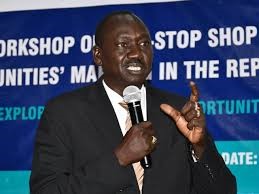By Philip Buda Ladu
South Sudan Ministry of Investment is advancing development of Investment Policy,” marking the first initiative of its kind since the country’s independence.
This policy aims to establish a legal framework that has been absent, allowing the government to foster a conducive environment for investment and to diversify the economy.
Since gaining independence in July 2011, South Sudan has struggled with ongoing political instability due to civil conflict, significantly affecting its investment climate.
Although the revitalized peace agreement of 2018 presents a potential pathway to stabilization through governance and economic reforms, its slow implementation has left the situation fragile. Consequently, the persistent risk of renewed conflict continues to deter potential investors.
Successful implementation of these reforms is crucial for enhancing investor confidence and fostering economic growth.
The investment policy validated on Tuesday marks a significant step towards positioning the country as an attractive investment destination once it is enacted by the national legislative assembly and comes into force through the president’s signature.
Addressing key challenges and outlining clear policy measures, the investment policy highlights the government’s commitment to fostering a business-friendly environment that promotes sustainable economic growth.
This policy will be a reflection of the government’s vision for a diversified, inclusive, sustainable economy where investments are protected and growth benefits all citizens of South Sudan.
Minister of Investment Dr. Dhieu Mathok Diing spoke to the media at the sideline of the validation workshop on South Sudan Investment Policy that was attended by various stakeholders including lawmakers, and national and state government representatives yesterday.
He said the document that was prepared by the Ministry of Investment and a consultancy firm “Otium” was opened for stakeholder such that they give their opinions on the policy before it proceed to the economic cluster and the cabinet for discussion before being passed to the parliament.
This validation workshop came against the backdrop of a consultative meeting held last month that drew many stakeholders onboard to inject their inputs on the document under development.
“I believe this is one of the strategic documents in this country which is going to save the economy of the Republic of South Sudan,” Mathok said. “If it is passed and implemented we will see many changes in the lives of the citizens of South Sudan.”
He emphasized that they are happy the document formulation is in the final stages.
“We are going to take it to the economic cluster such that it is discussed and passed and then we take it to the council of ministers where it will also be deliberated and passed by the national legislative assembly,” Mathok explained the remaining stages
The minister underscored that the policy document has met the vision and mission of the Ministry of Investment adding that the document is not only for the investment ministry but for the whole country.
“This is the first investment policy of its kind that South Susan is trying to legislate to help boost its economy” he noted.
According to Mathok one of the reasons why “our economy” is deteriorating is because the other sectors are not developed and the country is just depending on the oil sector which is the only source of income for South Sudan despite the abundant resources in Agriculture, Tourism among other sectors.
Once enacted and implemented the policy is going to encourage the investors, because it’s going to tackle the issues which are preventing the investors from coming to South Sudan.
Minister Mathok said these challenges were discussed and the policy is going to come up with solutions and answers to those questions.
“I believe if we managed to implement this policy, the other sectors will come up such as; agriculture, mining, energy and by doing that we will create another window for revenues to come to the government,” he stated.
The policy targets four important objectives key among which is strengthening the South Sudan Pound by boosting local production to produce surplus and sell to bring in more hard currency instead of only depending on crude oil.
Furthermore, the policy aims to strengthen entities which are doing business in the country especially coming up with new mechanisms and institutions including the “South Sudan Investment Council” which is going to be led by the president.
“The policy is going to answer many things; the issue of insecurity, infrastructure which is lacking, the question of legal framework which is necessary and the issue of strengthening the institutions these are things that the policy is going to answer” Mathom highlighted.
Meanwhile, to answer the question of lack of implementation, the policy will also contain evaluation and monitoring mechanisms that would address the issue of non-implementation of the investment policy once enacted.




